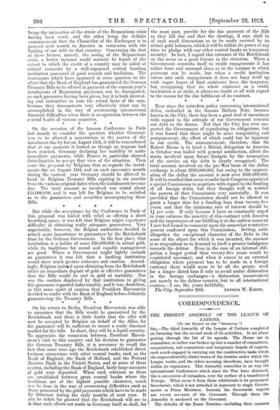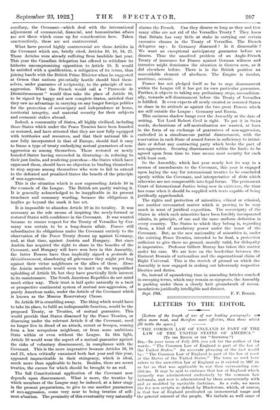CORRESPONDENCE.
THE PRESENT ASSEMBLY OF THE LEAGUE OF NATIONS.
[To THE EDITOR or THE " SPEOTATOR."3
Snr,—The third Assembly of the League of Nations completed on Saturday last the second week of its activities. It set about getting through the list of its agenda. The House sat in committee, or rather was broken up into a number of committees, commissions, sub-committees and temporary boards of experts, each much engaged in carrying out the constructive tasks which the unprecedentedly elastic terms of the treaties under which the League works, and the riders accruing therefrom, have brought within its cognizance. This Assembly resembles in no way the international Conferences which since the War have skimmed, like a succession of tornadoes, over the surface of a transformed Europe. What saves it from those whirlwinds is its permanent Secretariat, which is not attached in segments to single Govern- ments or Prime Ministers. Instead, the Secretariat experts are sworn servants of the Covenant. Through them the Assembly is anchored on the Covenant.
The Articles of the Peace Treaties—including their common
corollary, the Covenant—which deal with the international adjustment of commercial, financial, and humanitarian affairs are not those which come up for consideration here. Taken constructively, these are not controversial.
What have proved highly controversial are those Articles in the Covenant which are, briefly cited, Articles 10, 16, 18, 21. Those Articles were already suffering from landslide last year. This year the Canadian delegation has offered to withdraw its hitherto uncompromising opposition to Article 10. It would be satisfied with a qualification, a mitigation of its terms, thus jOining hands with the British Prime Minister when he suggested at Genoa that nations ptrtentially hostile should bind them- selves, under guarantee of reciprocity, to the principle of non- aggression. What the French would call a " Protocole de DesintAressement " would thus take the place of Article 10, to be signed by happy and now complete States, satisfied that they saw no advantage in carrying on any longer foreign politics for the protection of sovereignty and independence at home, territorial integrity, and material security for their subjects and economic stakes abroad.
Indeed, a community of States, all highly civilized, including those States which under the Peace Treaties have been founded or restored, and have attested that they are now fully equipped with territories and resources, and that their national life is now fully incorporated in that of Europe, should find it easy to frame s type of treaty embodying mutual guarantees of non- aggression as among themselves. Those restored or newly founded States having succeeded in disarming—in reducing to their just limits, and rendering powerless—the States which have oppressed them, should have no objection to binding themselves to stop anyone among themselves who were to fail to extend to the defeated and penalized States the benefit of the principle of non-aggression.
This is the situation which is now superseding Article 10 in the counsels of the League. The British are partly waiving it. It is generally acknowledged to be inapplicable in its present trenchant and summary wording, because the obligations it implies go beyond the mark it has set.
It is impossible to abandon Article 10 in its totality. It was necessary as the sole means of inspiring the newly-formed or restored States with confidence in the Covenant. It was wanted because to ensure respect for the Treaty of Versailles by Ger- many was certain to be a long-drawn affair. France still subordinates its obligations under the Covenant entirely to the observation of the Peace Treaty drawn up against Germany, and, at that time, against Austria and Hungary. But since Austria has acquired the right to share in the benefits of the Covenant, and Hungary will have won hers in this Assembly, the latter Powers have thus implicitly signed a protocols de desinieressement, abandoning all grievances they might yet hug against their victor neighbours or the allies of these. Alone the Asiatic members would seem to insist on the unqualified upholding of Article 10, but they have practically little interest in its maintenance. The South American Republics do not mind much either way. Their trust is laid quite naturally in a tacit or prospective continental system of mutual non-aggression, of purely American make, under the Article of the Covenant which is known as the Monroe Reservatory Clause.
So Article 10 is crumbling away. The thing which would have to take its place, to fulfil an indispensable function, would be the proposed Treaty, or Treaties, of mutual guarantee. This would provide that States disarmed by the Peace Treaties, or disarming under the relevant Article 8 of the Covenant, need no longer live in dread of an attack, covert or brusque, coming from a less scrupulous neighbour, or from some ambitious State within or even without the League. In this light, Article 10 would wear the aspect of a mutual guarantee against the risks of voluntary disarmament, in compliance with the Covenant. This is the more imperative because Articles 16, 18 and 21, when critically examined both last year and this year, appeared impracticable in their stringency, which is ideal, much more than applicable to facts. Besides, there are secret treaties, the excuse for which should be brought to an end.
The full Constitutional application of the Covenant now depends upon disarmament. What is more, the treaties by which members of the League may be induced, at a later stage in the present preparations, to give to one another guarantees of non-aggression, come very near to being treaties of self- • neutralization. The proximity of this eventuality very naturally alarms the French. Can they disarm so long as they and Ger- many alike are not rid of the Versailles Treaty ? They know that Britain has very little at stake in carrying out certain excessive clauses in the Treaty of Versailles. The French delegates say : Is Germany disarmed ? Is it disarmable ? We want an exceptional anticipatory guarantee before we disarm. Thus the unsolved problem of an Anglo-French Treaty of insurance for France against German wiliness and intrusive might dominates the situation in Geneva now, as it did elsewhere before. There is in the British position an unavoidable element of aloofness. The Empire is insular, maritime, oceanic.
France has not pledged itself so far to urge disarmament within the League till it has got its own particular guarantee. Further, it objects to taking any preliminary steps, uncondition- ally, towards self-disarmament before the Treaty of Versailles is fulfilled. It even expects all newly created or restored States to share in its attitude as against the two great Powers which are still outside the League : Germany and Russia.
This ominous shadow hangs over the Assembly at the date of writing. Yet Lord Robert Cecil is right. To put it in Swiss words, declarations of self-neutralization are wanted, at least in the form of an exchange of guarantees of non-aggression, embodied in a simultaneous partial disarmament, with the reservation in each State of armed forces in sufficiency to intimi- date or defeat any contracting party which broke the pact of non-aggression. Securing disarmament within the limits to be agreed upon from time to time means most security for each with least cost.
So the Assembly, which last year nearly lost its way in a morass of amendments to the Covenant, this year is engaged upon laying the way for international treaties to be concluded openly within the Covenant, and interpretative of dicta which otherwise are not compressible into legal forms. The permanent Court of International Justice being now in existence, the time has come when it should be supplied with texts capable of being juridically apprehended.
The rights and protection of minorities, ethical or ethnical, are another covenanted matter which is proving to be very much in want of juridical exposition. The sovereignty of the States in which such minorities have been forcibly incorporated admits, in principle, of one and the same uniform definition in every country. The States to which they belong is, regarding them, a kind of mandatory power under the tenor of the Covenant. But, as the new nationality of minorities is, under the existing Peace Treaties, intended to be final, a protection sufficient to give these no ground, morally valid, f or disloyalty is imperative. Professor Gilbert Murray has taken this matter under his care. We are here on the borderline between the Eminent Domain of nationalism and the supernational claim of Right Universal. This is the stretch of ground on which the Assembly is now engaged in staking out laboriously respective liberties and duties.
So, instead of squandering time in amending Articles couched in sweeping terms, which may remain as signposts, the Assembly is pushing under them a closely knit groundwork of recom- mendations juridically intelligible and distinct.



































 Previous page
Previous page